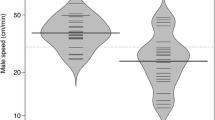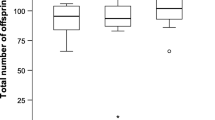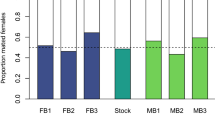Summary
Sphecius grandis is a univoltine, colonial wasp. Females mate once and are sexually receptive when they emerge in July and early August. Males generally emerge earlier in the summer than females. The opportunity for each male to acquire mates is a function of the number of females emerging during his lifetime and the number of competitiors that are active when the females emerge. I determined a mating opportunity index (MOI) for each male in an aggregation of wasps for three separate summers, and correlated the MOI of individual males with their emergence date. The MOI of a male estimates the potential contribution that timing of emergence makes to his reproductive success. In 1984 males emerging near the mean of the male emergence distribution had the highest MOI. These males emerged between one and two weeks prior to the mean female emergence date. However, in 1981 late emerging males had the highest MOI. In 1983 there was no significant difference in MOI among males. As a result of between-year variation in female emergence schedules and in the duration of male lifetime, the selection pressures influencing male emergence time vary between years.
Similar content being viewed by others
References
Alcock J (1976) The behavior of western cicada killer males, Sphecius grandis (Hymenoptera: Sphecidae). J Nat Hist 9:561–566
Dambach CA, Good E (1943) Life history and habits of the cicada killer (Sphecius speciosus) in Ohio. Ohio J Sci 43:32–41
Darwin CR (1871) The descent of man, and selection in relation to sex. John Murray, London
Emlen ST, Oring LW (1977) Ecology, sexual selection, and the evolution of mating systems. Science 197:215–223
Evans HE, West-Eberhard MJ (1970) The wasps. University of Michigan Press, Ann Arbor
Gwynne DT (1980) Female defense polygyny in the bumblebee wolf, Philanthus bicinctus (Hymenoptera: Sphecidae). Behav Ecol Sociobiol 7:213–225
Hastings J (1986) Provisioning by female western cicada killer wasps, Sphecius grandis (Hymenoptera: Sphecidae): influence of body size and emergence time on individual provisioning success. J Kansas Entomol Soc 59(2):262–268
Hastings J (in press) The influence of size, age, and residency status on territory defence in male western cicada killer wasps (Sphecius grandis, Hymenoptera: Sphecidae). J Kansas Entomol Soc
Iwasa Y, Odendaal FJ, Murphy DD, Ehrlich PR, Launer AE (1983) Emergence patterns in male butterflies: a hypothesis and a test. Theor Pop Biol 23:363–379
Nielsen HT, Nielsen ET (1953) Field observations on the habits of Aedes taeniorhynchus. Ecology 34:141–156
Richards OW (1927) Sexual selection and allied problems in insects. Biol Reviews 2:298–364
Thornhill R, Alcock J (1983) The evolution of insect mating systems. Harvard University Press, Cambridge
Wiklund C, Fagerstrom T (1977) Why do males emerge before females? A hypothesis to explain protandry in butterflies. Oecologia 31:153–158
Author information
Authors and Affiliations
Rights and permissions
About this article
Cite this article
Hastings, J. Protandry in western cicada killer wasps, (Sphecius grandis, Hymenoptera: Sphecidae): an empirical study of emergence time and mating opportunity. Behav Ecol Sociobiol 25, 255–260 (1989). https://doi.org/10.1007/BF00300051
Received:
Accepted:
Issue Date:
DOI: https://doi.org/10.1007/BF00300051




